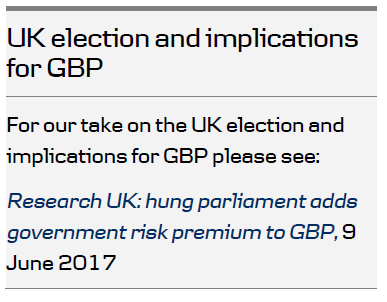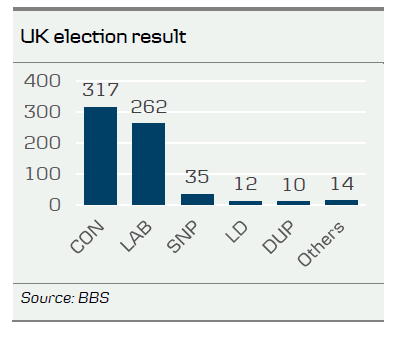Theresa May stays for now but is clearly weakened
Final result. Conservative 317 seats, Labour 262 seats, Scottish National Party 35 seats, Liberal Democrats 12 seats, Democratic Unionist Party 10, Sinn Fein 7, Others 7.
While, as expected, PM Theresa May is forming a minority government supported by the Democratic Unionist Party (DUP), the bigger question is whether she is a ‘dead woman walking’, as previous Chancellor of the Exchequer George Osborne put it. PM Theresa May called for a snap election in order to consolidate power within the Conservative Party and House of Commons, as she was greatly ahead in opinion polls at that time. As it failed, Theresa May’s position is clearly weakened and she had to let her two Chiefs of Staff (Nick Timothy and Fiona Hill) go. Gavin Barwell (moderate Conservative) has been appointed new Chief of Staff. The Telegraph writes that almost two-thirds of Conservative Party members want Theresa May to resign.
Still, it is not easy for the Conservatives to get rid of Theresa May now, as the Brexit negotiations are set to start soon and a leadership contest will only increase uncertainty. Note a leadership can be triggered in two ways: (1) If 15% of Conservative MPs lose confidence with the leader and (2) the leader resigns
Boris Johnson, seen by many as a candidate for succeeding Theresa May, has urged Conservatives to back Theresa May (reasons: (1) she won the most Conservative votes since Margaret Thatcher, (2) the government must focus on Brexit, (3) the people do not want a new election).
A likely scenario is that Theresa May stays for now but is replaced at a later point in time. Theresa May refused to answer yes when asked if she will stay a full term.
Minority government is weak from the beginning
Regarding the corporation between the Conservatives and DUP, we got some different messages over the weekend, not least since Downing Street’s No 10 issued a statement saying a ‘confidence and supply’ deal was reached, which the DUP later rejected. Downing Street later said the statement was issued in error. The conclusion is that negotiations between Theresa May and the DUP are not concluded and are set to continue this week. Notice that the Conservatives have rejected a more formal agreement due to the DUP’s views on same sex marriage, death penalty and abortion.
The Queen’s speech, a speech held by the Queen, written by the government and which sets out the government’s agenda for the coming year, is due to take place on 19 June.
Irish Prime Minister Enda Kenny wrote on Twitter that he has told PM Theresa May he is concerned about her relying on support from the DUP, as it may put the Good Friday agreement at risk.
Brexit: Theresa May challenged by both Brexiters and Remainers
On Brexit, PM Theresa May is being challenged by both Brexiters and Remainers. Most noticeable is Ruth Davidson, leader of the Scottish Conservative Party (who won 13 out of 59 Scottish seats, up from just one in 2015), has threatened to break away from the Conservatives to form a separate organisation, see The Telegraph.
Ms. Davidson has vowed to use the Scottish votes to prioritise the single market over curbing immigration, thus rejecting Theresa May’s hard Brexit.
Sky News Sources say cabinet ministers are ‘privately lobbying the PM to alter the Brexit plan from ‘ideologically driven’ approach to a ‘pragmatic Brexit’.
Also, the EU seems to be taking advantage of the weak Prime Minister. See The Guardian. EU sources say it will take 12 months for the EU to change negotiating guidelines about the phased negotiations (first divorce bill, citizens’ rights and Irish border, second future relationship), which PM Theresa May has rejected, as she wants the talks about the withdrawal agreement and the future relationship conducted simultaneously.
You can find an overview of the DUP’s view on Brexit in a tweet from Open Europe here. The DUP wants to maintain the Common Travel Area and a frictionless border (and hence remain in the Customs Union), which indicates a softer Brexit, However the DUP’s desire to have an ‘effective immigration policy which meets the skills, labour and security needs of the UK’ may imply a harder Brexit. The EU will be against this.
Theresa May has told Angela Merkel that the Brexit negotiations will start this month, see POLITICO.
Theresa May reappoints most important Cabinet members
Theresa May did not reshuffle the most important positions in her new cabinet. Philip Hammond is still Chancellor of the Exchequer (finance minister), which may surprise some given the conflicts between the two, but media reports indicate that she is too weak. Boris Johnson remains as Foreign Secretary, Amber Rudd as Home Secretary and David Davis is Brexit Secretary. Liam Fox is not among the most important cabinet members but continues as Trade Secretary. Michael Gove, who was sacked as Justice Secretary by Theresa May last year after he ran in the Conservative leadership contest after David Cameron resigned, has been appointed as Environment Secretary.
Damian Green (Remainer) is named Deputy Prime Minister, which may be an indication of a softer Brexit. Green will play an important role in the Brexit negotiations but his softer Brexit approach is likely to only be behind the scenes. See The Guardian.
Trump may not visit the UK after all
Sources say US President Trump has told PM Theresa May he refuses to visit the UK if there are public protests, see The Guardian. While both US and UK officials deny the story, it seems unlikely in our view that a US-UK free trade deal will be reached anytime soon, also given Trump is busy with many other things.


